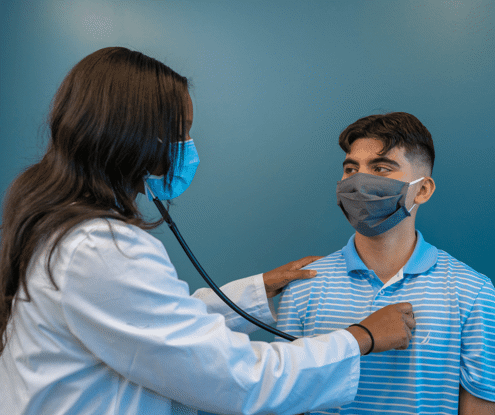The Difference Between A Pediatrician And A Physician
- Category: Consumer Health
- Posted On:

Having an injured or sick child is stressful for any parent. Usually, the first thought that comes to find is to rush your child to an emergency room, whether that means a Coppell emergency care center or your local hospital emergency room. When you get there, your child is likely to be helped by either a pediatrician or a physician. But, is there a clear distinction between the two? Here are the facts and differences between these two professions.
What is a Physician?
A physician is also known as a medical doctor. Their main work is to take care of the patient, diagnose them, and recommend medication. Family physicians see patients of all ages and provide treatment for a variety of common ailments. They are usually the first to notice if your child has a major health problem.
What is a Pediatrician?
A pediatrician, on the other hand, will provide specialized care for your child because they have been specially trained to care for children. They manage the physical, mental, and emotional well-being of kids of all ages, from infants to adolescents. Every time your child has an emergency, and you visit a pediatric urgent care clinic, a pediatrician will attend to your child.
Is it Better to See a Pediatrician or a Family Doctor?
The answer to this question has no right or wrong answer. Both family medical centers, pediatric urgent care, and hospitals will have both pediatricians and family physicians available. While pediatricians specialize in handling issues related to children, a family doctor is also capable of making a diagnosis and giving the right treatment.
If a family doctor, for instance, has been known to deal with issues affecting everyone in the family, including kids, you can trust their judgment. With experience comes knowledge which cannot be undermined by a title.
On the other hand, a pediatrician has gone through training that specifically prepares them to deal with issues that affect children. This training sets them up to handle children during diagnosis, ask questions in a way a child will understand, and generally take care of the child’s well-being. Whenever you need to visit a Coppell emergency care center, your child has a higher chance of seeing a pediatrician than a family doctor.
Unlike hospitals where pediatricians work in shifts, (and sometimes there are none available, especially at night), an emergency care unit will always have a pediatrician on-site to take care of your child. Like in any other emergency room, the nurse will first see your child to determine the urgency of his care. A child who needs urgent emergency treatment is always seen first, so don’t be surprised if another child sees the doctor before you.
Both family doctors and pediatricians will have gone through enough medical training to care for children. A question of who sees your child is therefore left for you to decide. Look at all the options and decide who you prefer.
In emergencies, however, it is best to have pediatricians care for your child. This does not mean that a family doctor will do a lousy job. It just means that a pediatrician has more experience in dealing with kids.
How to Contact a Pediatrician Near You
When there is an emergency, you want to see a doctor as quickly as possible, and the internet may be the first place to get a hint on the nearest Coppell emergency care center. However, parents should always be prepared by looking around beforehand. Search for the best Coppell emergency care center when your little one is not sick. This will give an opportunity to talk to the physicians, know what the emergency center treats, and even test run how long it will take you to get to the center. You may also want to see how long the wait time is at the health care center that you want to go to. The average wait time you should expect in an urgent care center is 30 minutes. The Urgent Care Association says this is the time maintained by 92% of the urgent care center in 2015.
Being ready in an emergency gives you a head start. While we don’t welcome emergencies, they are so abrupt that being prepared comes in handy.


.png)